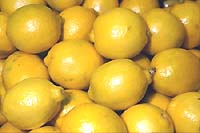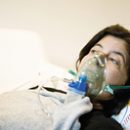What is vitamin C or ascorbic acid? Where this vitamin contains? What role ascorbic acid is playing in the body? What happens when the lack and excess of this vitamin?
Content
Vitamin C (ascorbic acid)
The history of the opening of vitamin C is associated with Qing. In those distant times, this disease especially hit the navigators. Strong, brave sailors were powerless in front of Qing, which also often led to death. The disease was manifested by the overall weakness, bleeding of gums, as a result of which the teeth fell out, rash appeared, hemorrhage on the skin. But the path of cure was found. So, sailors, following the example of the Indians, began to drink water extract of pine needles, which is a storehouse of vitamin C. In the XVIII century, the Surgeon of the British Fleet J. Linda showed that the disease of the sailors can be cured by adding fresh vegetables and fruits in their diet. Another other fact is interesting: Albert Background Saint-Differ, Vitamin C, actually opened a whole complex of vitamins and showed that with routine and bioflavonoids Action of vitamin C becomes especially powerful.
According to the famous author «Atkinson's diet», Dr. Robert Atkinson: «Vitamin C has such great importance for our health that I do not even remember the disease, in which the reception of this vitamin will not lead to any improvement. What disease neither take, whether there is a cold or cancer, hypertension or asthma, in all cases you can recommend the reception of this vitamin...».
Where is Vitamin C
The main and most famous source of vitamin C is, of course, citrus. Other vegetable sources are: Rosehip fruits, green vegetables, currant, tomatoes, cauliflower and potatoes. From the products of animal origin vitamin from rich liver.
On average, our body requires 70 mg vitamin C. But do not forget that every organism is individual, and that there are age restrictions. The need for vitamin C has influence and seasonal factors, stress. It was also found that when taking some drugs (for example, contraceptives), the need for the body in vitamin C increases.
Vitamin C value
Vitamin C and cold, infectious diseases
 The main function of vitamin C is the strengthening of the immune system. And, first of all, his help is needed leukocytes (white blood cells) that consume the stock of vitamin C when combating diseases. Linus Polling put forward a hypothesis that he can be treated forever from a cold, taking high doses of vitamin C (1 - 5 g. per day for 1 - 2 days). Research results have shown that vitamin C significantly facilitates cold symptoms. This action is due to vitamin ability to mobilize the body's immune system. It was also shown that the daily reception of ascorbic acid athletes-runners allows them to completely avoid infections of the upper respiratory tract, which are professional diseases of such athletes.
The main function of vitamin C is the strengthening of the immune system. And, first of all, his help is needed leukocytes (white blood cells) that consume the stock of vitamin C when combating diseases. Linus Polling put forward a hypothesis that he can be treated forever from a cold, taking high doses of vitamin C (1 - 5 g. per day for 1 - 2 days). Research results have shown that vitamin C significantly facilitates cold symptoms. This action is due to vitamin ability to mobilize the body's immune system. It was also shown that the daily reception of ascorbic acid athletes-runners allows them to completely avoid infections of the upper respiratory tract, which are professional diseases of such athletes.
Vitamin C activates the synthesis of interferon - the main antiviral «guns» Cells. Especially effective vitamin C in combination with zinc, bioflavonoids, vitamin A, together they constitute «Anti-infectious kaoleition». Nature itself created such a powerful duet, and these vitamins in plants are also in the complex. Vitamin C reduces intraocular pressure, reducing the risk of cataracting.
Vitamin C and Sustaines
Vitamin C is a coenzyme (part of the enzyme) necessary for the formation of basic connective tissue proteins, in particular, bone and cartilage tissues. Normalizes metabolic processes in them; Promotes the prevention of age-related, inflammatory and exchange lesions of the joints of the limbs and the spine.
Vitamin C and Cardiovascular Diseases
It is known that oxidized cholesterol forms are capable of postponed in the walls of blood vessels, forming atherosclerotic plaques. Vitamin C in a complex with bioflavonoids lowers the level «Poor» LDP cholesterol (low density lipoproteins), and increases the level «Good» Cholesterol LVP (high density lipoproteins), protecting the walls of blood vessels. Also, vitamin C can regulate blood pressure, providing a hypotensive effect.
Vitamin C and Oncological Diseases
Vitamin C is one of the main links of the antioxidant protection system of the body of cancer, and, moreover, it is recognized as one of the strongest anticancer among nutrients. Vitamin C protects against nitrates contained in fruits and vegetables. Nitrates are the starting point for education in the body of a dangerous carcinogen - nitrosamine. Therefore, doctors recommend taking vitamin C for the prevention of gastric and intestine cancer. In addition, vitamin C is included in the treatment complex in the period after chemotherapy and irradiation courses.
Vitamin C and Stress
Scientists give the palm of championship vitamin C among other vitamins and nutrients, as the most effective anti-physical and emotional treatment facility. Adrenal glands that highlight hormones for the response of the body in stressful situations, contain the most ascorbate, compared to any other part of the body. Vitamin C, also, due to its antioxidant and oxidative activities, neutralizes the toxins formed in the process of stress metabolism. It is known that one of the reasons for mental deviations in humans are toxic exchange products.
Lack of vitamin C organism
The primary signs of the shortage of the body or hypovitaminosis are such manifestations:
- reduction of mental and physical performance;
- lethargy, weakness;
- decrease in immunity;
- Slow recovery from transferred diseases, long-lasting scratches, wounds.
Signs of pronounced hypovitaminosis with:
- Increased sensitivity to cold, unreasonable chills;
- fast fatiguability;
- drowsiness or bad sleep;
- reduced appetite;
- Depression and irritability;
- Pain in the legs and lower back;
- tachycardia.
Hypovitaminosis (disadvantage) of vitamin C is developing with a deficiency of vitamin in food for 1-3 months, and after 3-6 months the qing is already developing.
In the appearance of signs of the disease, vitamin tops are appointed.
Prevention of hypovitaminosis S It consists in regular eating products containing vitamin C; If this is difficult (for example, in the regions of the Far North), it is advisable to use small doses of vitamin C or infusion of rosehip and needles; Rosehip syrup take 1 teaspoon.
With violation of the dosage of the drug vitamin C, allergic reactions and the development of signs of hypervitaminosis are possible.
Excess ascorbic acid in the body
There is a so-called principle «intestinal tolerance» Robert Katkarta, according to which, the dosage of vitamin can be increased as long as the intestine is able to transfer it. We think that you bring ourselves to diarrhea - at least absurd. What is fraught with hypervitamin?
-
Diarrhea.
-
In persons with a lack of a certain substance (enzyme glucose-6 phosphate dehydrogenase), high doses of vitamin C lead to the destruction of red blood cells, accompanied by a hemoglobin (hemolysis).
-
Pregnant women and people with increased blood coagulation should be carefully used by large doses of vitamin C.
-
Sick diabetes mellitus should not consume high doses of vitamin C, due to its influence on the insulin apparatus of the pancreas.
Recommendations for receiving vitamin C
-
Divide the daily dose of vitamin C into several techniques, t.To. The body quickly consumes vitamin. This maintains a constant high concentration of vitamin C in blood.
-
Use vitamin C during meals. Since digestive enzymes increase the digestibility of vitamin and increase its blood concentration.
-
Do not forget that vitamin C is especially useful in combination with bioflavonoids, as well as with minerals (for example, with magnesium).
- Vitamin C significantly increases the stability of other vitamins belonging to the products.









